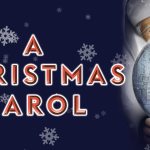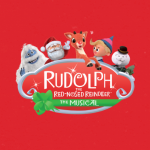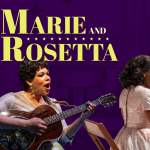Caravan Ensemble at Early Music Now
A Jewish hootenanny broke out at the Early Music Now concert Saturday, as the Caravan Ensemble surveyed Sephardic music from Spain to Persia. Caravan specializes in this music, which reflects the cultural influences the Sepharad picked up in their travels (some prompted by choice and opportunity, some by oppression and expulsion).
The Sepharad are primarily associated with Spain, where they served both Moorish and Christian courts during their 700-year struggle for control of the Iberian peninsula. Caravan sensibly reflects both Moorish and Spanish influences. Front man Gerard Edery plays a Spanish guitar; lead soloist Ara Dinkjian plays the Moorish oud, a short-necked lute. Barbara Martinez danced flamenco style (it was total news to me that Sephardic women danced in this sensual way) and sang. Amir Vahab played the saz, a long-necked lute of Arabian origin. Glen Velez played a variety of frame drums and tambourine.
Edery and the others sang in Ladino (the southern equivalent of Yiddish), Spanish, Portuguese-Galician, Hebrew, Persian, Arabic and Spanish. Mostly, they sang of love or love lost, but there were some rousing religious anthems, too, some songs based on dance rhythms, and a couple of virtuoso percussion extravaganzas. Velez’s amazingly varied and engagingly structured tambourine solo was the highlight of the night.
Sephardic music, at least as Caravan plays it, reminds me of bluegrass: essentially simple, so anyone can play it, but with room for virtuoso elaboration for those who care to develop the skill. Dinkjian brought virtuoso flair to almost every number, with improvised solos of great speed and invention.
That sort of thing throws suspicion on Caravan’s scholarship. Are they trying to reconstruct Sephardic music as it would have been played in late Medieval times? Are they consciously synthesizing and updating, in the way of Gipsy Kings or New Grass? Or do they just grab the Big Sephardic Fake Book, put some instruments and their heads together and wing it? Any approach is fine with me, but it would be nice to know.























We always appreciate the coverage of the Third Coast Digest, and look forward to Tom Strini’s always forthright and often insightful observations. However, his final paragraphs here, by their style and tone, invite more response than it is appropriate for me to offer. Suffice it to say that most of the other nearly 400 people in the audience seemed to “get it,” as indicated by their rapt attention through a long concert, and their ovations at the end. They appeared to be enriched, entertained, and even enlightened. As for the intellectual intent of Caravan’s work, that is something that could be learned by asking.